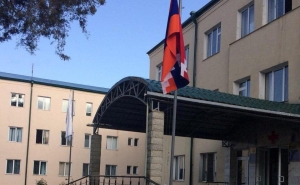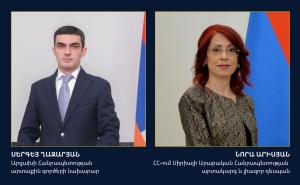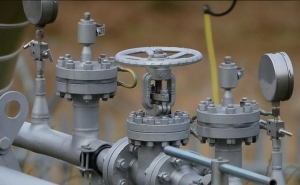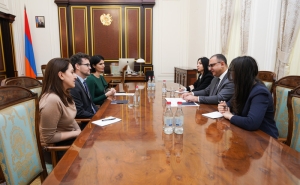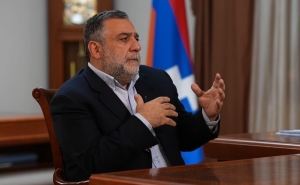 The Political System of the Republic of Nagorno-Karabakh
The Political System of the Republic of Nagorno-Karabakh

The Republic of Nagorno-Karabakh, in spite of many difficulties continues developing and becoming a real democratic country, an example for many countries. On May 3 elections of the National Assembly of NKR is scheduled, which, as the process of the campaign shows, is going to become another sign of a democratic country. To see where the roots of democracy in Karabakh or as it is very often called in Artsakh comes, it is important to understand the state system of the country.
On December 10, 1991 a referendum was held in Nagorno-Karabakh as a result of which the majority of the population (99.98%) voted in favor of full independence from Azerbaijan. Following the referendum, on December 28 parliamentary elections were held and the first government was formed. On September 2, 1991 a joint session of the People's Deputies of the Nagorno-Karabakh Autonomous Region and Shahumian regional councils, declared the establishment of the Nagorno-Karabakh Republic (NKR).
From that time on, despite the war and many hardships that till now are caused by Azerbaijan, NKR has been developing and strengthening. As it is written on the official website of the President of NKR, "The Nagorno-Karabakh Republic is a sovereign, democratic, secular, legal and social state, where power belongs to the people." The country has executive, legislative and judicial branches. According to the Constitution of the Republic of Nagorno-Karabakh adopted in 2006, the head of the state is the President, who is elected for the term of five years and the same person may not be elected for more than two terms. It is the President, who is the guarantor of sovereignty, independence, territorial integrity and security of the Nagorno-Karabakh Republic and he presents the country in the international relations. He is also the Commander-in-Chief.

The legislative body of the Republic is the unicameral National Assembly. The members of the Parliament are 33 elected for the period of five years. The Speaker of the Assembly is elected by the parliamentarians in a closed voting. As the official website of the NKR President writes, now the NKR National Assembly has 7 standing Committees - on foreign affairs; industry and industrial infrastructures; finance, budget and economic management; legal and state affairs; social issues; the issues of defense, security and legality; the issues of science, education, culture, youth and sports. It also has 3 factions – Democracy, Homeland, Dashnaktsutyun and Artsakhatun. The National Assembly adopts laws, decrees, resolutions, statements and appeals and its regular sessions are convened twice a year.
The Executive body of NKR is the Government with the head of the Prime Minister, who is appointed by the President of the country. The Government consists of 11 ministries. The Prime Minister chairs meetings of the Cabinet, which appoints and releases regional heads, except the Mayor of the capital Stepanakert. The mayor of the capital is being elected.
There is a three level judicial system in Artsakh - courts of first instance, court of appeal and Supreme Court, which also functions as Constitutional Court – it ensures Constitutional justice and the supremacy of Constitution. Courts in the country are independent and the judges are appointed for life until the age of 65.
Thus the political system of the Republic of Nagorno-Karabakh is one typical to democratic countries and the fact that it is not recognized internationally does not hinder it to develop and further on strengthen its democracy and make the life of its people better.
-
 17:08
17:08The regular session of the Anti-corruption Policy Council takes place in Jermuk
-
 15:05
15:05The Prime Minister sends congratulatory messages to the supreme leader of Iran and the President of Iran
-
 11:11
11:11Armenia sends earthquake aid to Turkey
-
 10:43
10:43Commemoration of the Pontiff St. Sahak Partev
-
 09:16
09:16Some roads are closed and difficult to pass in Armenia
-
 19:55
19:55Phone conversation of the Foreign Minister of Armenia with the U.S. Assistant Secretary of State for European and Eurasian Affairs
-
 18:30
18:30Prime Minister Pashinyan and President Khachaturyan meet
-
 18:20
18:20Ararat Mirzoyan with Co-Chairman of the OSCE Minsk Group of France Brice Roquefeuil
-
 17:01
17:01Humans could land on Mars within 10 years, Musk predicts
-
 16:45
16:45France, US urge 'immediate' end to Nagorno Karabakh blockade
-
 16:01
16:01Blockaded Nagorno Karabakh launches fundraiser to support quake-hit Syria
-
 15:59
15:59Earthquake death toll in Turkey rises to 18,342
-
 15:43
15:43Ararat Mirzoyan Held a Telephone Conversation with Sergey Lavrov
-
 15:06
15:06French president rules out fighter jet supplies to Ukraine in near future
-
 14:47
14:475 Day Weather Forecast in Armenia
-
 14:44
14:44President Vahagn Khachaturyan wrote a note in the book of condolences opened in the Embassy of Syria in Armenia
-
 14:20
14:20Azerbaijan’s provocations impede establishment of peace and stability – Armenian FM tells Russian Co-Chair of OSCE MG
-
 12:57
12:57France representation to OSCE: Paris calls on Azerbaijan to restore freedom of movement through Lachin corridor
-
 11:40
11:40Command of Kosovo forces highly appreciated preparation of Armenian peacekeepers
-
 10:16
10:16The United States withdrew from sanctions against Syria for six months the provision of assistance after the earthquake
day
week
month
Humidity: %
Wind: km/h



